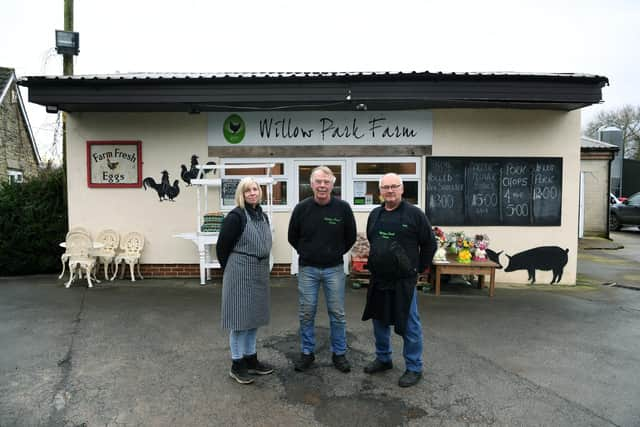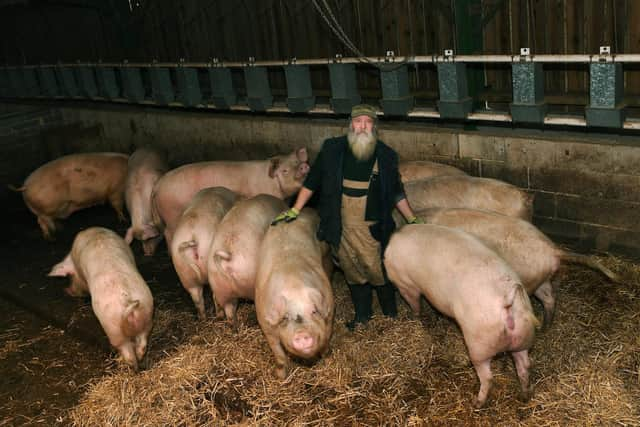Willow Park Farm: Farm shop in Yorkshire that quietly goes about its business after stepping back from Jack Fulton empire
But it wasn’t always that way for the man behind today’s much reduced enterprise from his and his father’s heyday of the 70s and 80s when the name Jack Fulton became synonymous with the frozen food world emanating from the home freezer revolution of the late 60s and saw them while at their height with 54 shops throughout Yorkshire.
“We were the biggest independent business of our kind in the country at the time,” says Ian Fulton, who is content with the farming business and farm shop he has today.
Advertisement
Hide AdAdvertisement
Hide Ad“We have layers, broilers and sows. We keep about 5000 layers, process up to 1500 broilers a month, and have 60 sows. What comes from them, the chicken, the eggs and the pork is pretty much all going through the shop.


“I started rearing slow growing broilers two or three years ago, which take a fair bit longer to mature. What we process each Wednesday will be eight weeks old, which puts them probably two to three weeks behind the standard broiler and means that bit more maturity adds to their flavour.
“We get them in as day-olds. They come from a bloke in Lincolnshire who trades as Poulet Anglais. I believe his breeding stock originally came from France but he now has a fair bit of Hubbard strains mixed in it. The breed is more like a traditional breeder and a lot easier to grow than a modern broiler.
“We feed them normal broiler rations and we have a really good shop trade. They generally get processed at between 2.5 to 3 kilos deadweight and we do between 1000 to 1500 per month.
Advertisement
Hide AdAdvertisement
Hide Ad“As we have our own licensed poultry slaughterhouse we also process spent hens when we get them, but they’re not for sale through the shop, they go out as wholesale.


Ian says it’s all a far cry from the days when he used to have 270,000 broilers on at any one time and when the business stretched over four farms and he had 35,000 layers at Willow Park.
“We just have 5000 layers now, all Lohmann breed, but with a mixture of browns and whites as we also sell a lot of white eggs through shop these days.
“I’ve knocked back the wholesale side over the last four or five years, although we still do a little.
Advertisement
Hide AdAdvertisement
Hide Ad“I rear them from day-olds. They start laying at between 16-18 weeks but I’m not looking to let them go at the time the big operators will do so, and mine will probably go as far as 100 weeks. It’s all going retail from the shop with a few going to milkmen and so if at 80-90 weeks old they’re throwing out 60-70 per cent large eggs they’re still worth keeping and it seems hens, particularly the Lohmanns, lay for a lot longer these days and nine times out of ten will keep a good shell on them as they age.
Ian’s sow population was once 250 at Willow Park, he’s now just less than a quarter of that.
“We only need the amount of production to reach about 20-25 pigs processed a week now. It’s all about having just enough for the shop and one or two smaller wholesalers who still come and buy.
“Our 60 sows breed litters that average around 13 twice a year. We are finishing about 10-15 pigs a week. We use Rattlerow sows and two boars from Rattlerow plus a bit of AI from JSR. They’re good sows and, like the layers and the broilers, we’re not in any great hurry to see them go.
Advertisement
Hide AdAdvertisement
Hide Ad“If they’re going okay, they’re still here. Some will have done nine parities, maybe even ten. That’s quite a bit more than other producers will do. I buy replacements from Rattlerow, usually around another 20-25 gilts every year. Once again, we use standard rations. We don’t push then over hard. It’s quite a low input unit. We’re not going for massive numbers or massive growth on them because we’re in a few different sorts of market these days.
Ian has found that the hog roast trade and specialist markets have increased the need for smaller pigs, which suits him fine.
“Through the summer we supply for a lot of hog roasts and we had struggled to get 40-50-60 kilo pigs at one time. We’re also finding that there are other markets for those who want to cook a whole pig and want them to be between 20-30 kilos. We are quite happy to supply smaller pigs for those that want them and we still have our regular size pigs going through the farm shop.
Ian says the farm and farm shop is now run by just over a handful rather than those heady freezer shop days and bigger farming operations that saw them employ hundreds.
Advertisement
Hide AdAdvertisement
Hide Ad“I’ve only one of our team who works on the farm full-time and I do a bit as well. I have five butchers, with four of them full-time, and Lisa Crossley who has worked for me 25 years. She does everything, she says. She’s pretty much right.
“When dad was thinking of retiring in his late 60s he asked whether I wanted to carry on the Jack Fulton freezer business or sell it. The only thing in the back of my mind was that if I’d said I’d keep it on, he would never retire and I knew my mother wanted him to.
“I said, ‘Sell it dad’. I think it was the right time. We’d had some fantastic times and I said I’d keep the farms we had, which we’ve now pared back to just Willow Park.
“I am extremely fortunate. We had an extremely good business and we did very well out of it. The timing, going in and out of it was perfect. I would hate to be doing it now. Every supermarket now is a discounter, and I don’t think there is an independent left. It was fun. I did enjoy it while we were doing it. I’m still doing this because I enjoy it and might as well do what I can manage and what my team can manage.
Advertisement
Hide AdAdvertisement
Hide Ad“The value was always in putting our own things through the shops and it still is today, it’s the bit in the middle where you don’t make much and are on a hiding to nothing most of the time.
Where Willow Park Farm Shop is now, is where the original house, a post-war prefab house, was bought by Ian’s dad.
“I was born here, in it,” says Ian. “It was freezing, forget frozen food, we were frozen Fultons! Dad bought this place in the dark in 1959.
“And dad wasn’t really Jack Fulton. That was my grandfather’s name, but my dad, who was really called James became known as Jack.